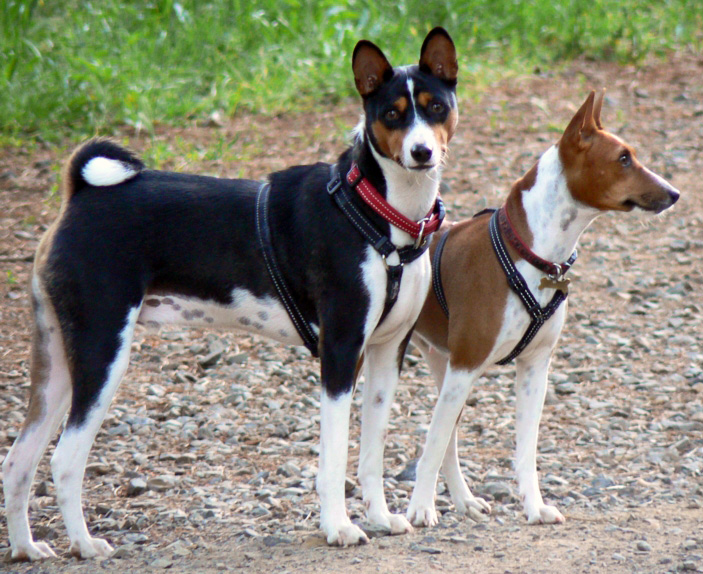 The Basenji is an African breed that developed in Zaire. It is sometimes called the Congo Dog or the Congo Terrier. They are not barkers, however, they do have a range of vocalizations that they make including crows and keening wails. They were developed to flush game birds from the bush.
The Basenji is an African breed that developed in Zaire. It is sometimes called the Congo Dog or the Congo Terrier. They are not barkers, however, they do have a range of vocalizations that they make including crows and keening wails. They were developed to flush game birds from the bush.
The Basenji is a small breed dog that will not grow taller than 17 inches, or weigh more than about 24 pounds. They have a short, smooth, silky coat that is appropriate for warming climates. The health problems that are associated with this breed include PRA, intestinal problems, and kidney problems.
To care for this breed you will want to bathe and brush their coat only as needed. They will need daily exercise to keep them from putting on too much weight. They have a naturally curious nature so you will want to make sure that you either keep them on a leash when at the park, or keep them in a securely fenced yard.
Have you ever heard of a “bark-less dog”?
Basenji is a unique breed of dog that does not bark it does, however, produce a weird yodel vocalization when excited. They have cat-like characteristics and they are naturally immaculate dogs.
Origins
Basenjis are ancient dogs that originated in Central Africa. The first known traces of the Basenji’s origins were found in Egyptian tombs and wall drawings.
They were hunters in the ancient world. They were used to assist in hunting by chasing game animals into traps and nets set by their masters.
Although very ancient, they were not brought to the western world until the 1930s. The earlier attempt to bring a batch to England succumbed to disease and died.
Basenjis were once speculated that they were descendants of Jackals but later, with the help of modern genetic testing, they were actually descended from Wolves.
Appearance and Abilities
Basenjis are small, poised, and athletic-looking dogs. They have a muscular and slender build perfectly suited for agility and speed.
They have excellent senses and are considered sight hounds. Their sense of smell is remarkable as well. They are alert hunters and they have a great ability to chase down game animals with great determination and endurance.
They have smooth and shiny coats with erect ears facing forward and a tightly curled tail. They are elegant looking and their faces seem to always squint. Basenjis always appear to be thinking deeply producing a very serious but amusing look.
Basenjis’ uniqueness starts from the inability to bark. This is because of the innate structure of their vocal chords. They can’t bark but instead they make a yodeling sound. Sometimes they may howl and growl, depending on how they feel.
Another distinctive feature of this breed is that female Basenjis go into heat only once a year, instead of the customary twice a year cycle.
Temperament and Tendencies
Basenjis are alert and athletic. They are full of energy and always curious about things going on around them. They are constantly ready to act if something comes up. They would be great watchdogs if they could only bark. They are independent and can go on their own but also willing to be trained.
They are Houdinis of the dog world; they always seem to be able to find a way to get out of fenced yards and they are able to climb. Basenjis are cat-like and tend to clean themselves. They are clean, nearly odorless dogs.
Basenjis are frisky and tireless playful dogs. They are balls of energy, always teasing their masters to play which can be a lot of fun if you are up to it.
They are naturally aggressive to non-canine pets. You should not mix them with other animals. But they are happy to be with other Basenjis. They are quite clannish in nature.
Training and Care
Basenjis needs firm and consistent leadership. Meek and inconsistent owners will find a very hard time managing them. They will take the alpha role for themselves so make sure to establish yourself as the alpha pack member.
Address bad behavior early. They can be very mischievous and a constant “no” command or reprimand must be implemented. Provide positive reinforcement to desirable deeds.
Grooming and hygiene is not a problem with these dogs. Bathe only when necessary. Basenjis rarely sheds which is very good news to folks who are very particular to dog hair.








12 Responses to “How to Train a Basenji”
My dog is a mix between a besinji and something else but i am not sure what it is. He does train well when it is just me and him but not good when around other people or dogs (such as neighbors) and i was wondering if some one could give me some tips on how i could get him to not bark and be nice when i introduce him to other people and when someone notices him. His name if Jackson and he has all the qualites of a besinji but his fore head does not wrinkle up and his tail is curled up. Thanks to any one who can help.
Training should be balanced. What that means is there should be proper motivation and proper correction. What type of correction do you use when he’s barking or around other people/dogs? Also, Basenjis can’t bark so perhaps his barking comes from the mix but there is a good chance he’s not a basenji mix.
I am having the same issue with my mix, she is smart and trainable with basic commands but she looses her mind with excitement when new people come around. TyBrown, I can show you a picture but there is no doubt that my dog is Basenji and she does bark, she does yodel and cry as well but she has a definite bark, we think she is part border Collie.
Linda. Why cant you ask a vet or git a trainer and ask him what dog he is
Hi I’m Larry and I have a Basenji We love her But she wont listen to me. If I give her a comand, she wont listen. So if your hearing
this. can you give me directions. Please!!!
Wow, do you publish this stuff your self or have
you got a content staff to do it for you?
I only ask because it is seriously excellent and I’m fed up with writing my own content.
We have a besenji puppy, 6 months
he has bitten my husband and snips at my daughter and son.
admittedly, the kids want to give him constant attention and sometimes he does not want it. but recently he’s begun growling and snipping when its time to go out before bed and he doesnt want to move.
It’s getting to be a problem, and we want to correct it because the kids love him
any advice
also seems to be bonded to me, not to other family members, doesnt ever snip at me, and want the others to have this with him too
thanks
How much time and attention have you put on obedience training and structure around the home?
I am in Desperate need of help! I have a neutered male basenji who is 1yr and 6 months old he used to be such a friendly little guy but over time has turned into a very aggressive dog. He is aggressive towards other animals and strangers even family members and friends. For example he’s in my husbands lap enjoying being pet and then the next second he snaps and aggressively attacks. It has gotten to a point were we feel hopeless. How can we start a family and raise children, let alone have someone watch are dog if we go out of town. Most of the time he is a sweetheart and enjoys to be surronded with the family. but it has become a weekly occurance and has left everyone scared to even come near him. Im just concered for our future. Is there any tips or advice into stopping this behavior. It will break my heart get rid of him he is part of the family. I want to try all my options before having to consider giving him up. Please help!!!
Have you got him checked out by a vet? A sudden and unpredictable onslaught of aggression can sometimes be related to some sort of pain the dog is experiencing.
Yes he has been checked out by a vet and was even agressive towards the dr. He is a healthy dog im beging to lose hope im willing to try anything at this point.
My recommendation, then, is that you have to focus on keys to overcoming aggression:
1- Achieve advanced obedience
2- Apply that obedience to moments when your dog’s aggression is triggered
3- Correct the aggression when it occurs
https://www.dogbehavioronline.com/curing-dog-aggression-p/